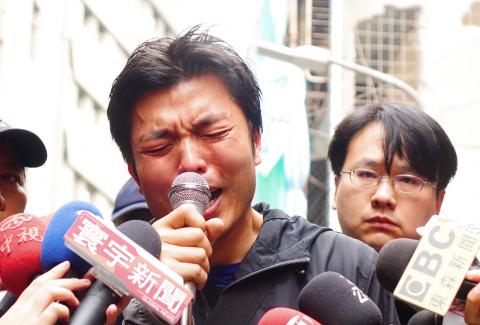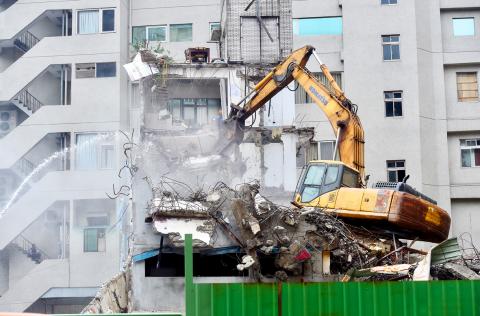The Taipei City Government on Wednesday lifted a restriction on private urban renewal projects, allowing it to tear down homes on behalf of construction firms even if 10 percent or more homeowners involved are opposed to a project.
Taipei Deputy Mayor Charles Lin (林欽榮) made the announcement at a conference with construction company executives.
The restriction had stated that the owner of a private urban renewal project could only request the city government to demolish a building on its behalf if the number of property owners opposed to the project was fewer than 10 percent of the total number involved.

Photo: Chien Jung-fong, Taipei Times
Lin said the restriction had been promulgated in a fit of “panic” sparked by the controversial Wenlin Yuan urban renewal project in Shilin District (士林) in 2012 when then-Taipei mayor Hau Lung-bin’s (郝龍斌) administration tore down the home of a family opposed to the project.
Lin said that the 10 percent rule would be abolished within a month, adding that as long as the number of property owners opposing a project does not exceed one-third, the legal standard stipulated in the Urban Renewal Act (都市更新條例), project owners would be able to request the city’s help when carrying out demolitions.
The act stipulates that a developer can demolish a building after obtaining the consent of two-thirds of homeowners that together own at least 75 percent of land zoned for renewal, provided that property redistribution plans have been approved by the city government.

Photo: Chien Jung-fong, Taipei Times
Residential rights advocates were up in arms after the announcement.
Yongchun Urban Renewal Project Self-help Group convener Liu Te-fen (劉德玢) said that easing the rules would only sow discord and incite conflict between opponents of projects and construction firms, which he said would likely exploit the new rules to have homes forcibly demolished.
“This will surely make Taipei Mayor Ko Wen-je (柯文哲) the focus of public anger,” Liu said.
In related news, the Taipei Urban Regeneration Office yesterday proceeded with the demolition of an apartment building on Changan W Road abandoned by developer SWJ Construction Co (欣偉傑建設) earlier this month, citing “public safety concerns.”
The building sat on a plot that had been zoned for a private urban renewal project, with an owner surnamed Chang (張) being the sole opponent of the project.
SWJ Construction earlier this month knocked down the building without informing Chang, who had just left a meeting with representatives from the construction firm at the time.
Taipei Urban Regeneration Office chief engineer Chang Li-li (張立立) said the wreckage was removed in accordance with Article 58 of the Building Act (建築法), which stipulates that a local government has the authority to execute “compulsory demolition” if a building is deemed to pose risks to public safety.
The apartment building could have jeopardized the neighboring buildings in the event of an earthquake, Chang said.
The homeowner accused the city government of having adopted an “inhuman approach” for allowing his home to be torn down and not ordering SWJ Construction to make amends for the damage done to his home.
The city government behaved in an unconstitutional manner by infringing the homeowner’s residential rights, Taipei Clean Government Committee member Wang Hsiao-yu (王小玉) said.
Additional reporting by Kuo An-chia

The CIA has a message for Chinese government officials worried about their place in Chinese President Xi Jinping’s (習近平) government: Come work with us. The agency released two Mandarin-language videos on social media on Thursday inviting disgruntled officials to contact the CIA. The recruitment videos posted on YouTube and X racked up more than 5 million views combined in their first day. The outreach comes as CIA Director John Ratcliffe has vowed to boost the agency’s use of intelligence from human sources and its focus on China, which has recently targeted US officials with its own espionage operations. The videos are “aimed at

STEADFAST FRIEND: The bills encourage increased Taiwan-US engagement and address China’s distortion of UN Resolution 2758 to isolate Taiwan internationally The Presidential Office yesterday thanked the US House of Representatives for unanimously passing two Taiwan-related bills highlighting its solid support for Taiwan’s democracy and global participation, and for deepening bilateral relations. One of the bills, the Taiwan Assurance Implementation Act, requires the US Department of State to periodically review its guidelines for engagement with Taiwan, and report to the US Congress on the guidelines and plans to lift self-imposed limitations on US-Taiwan engagement. The other bill is the Taiwan International Solidarity Act, which clarifies that UN Resolution 2758 does not address the issue of the representation of Taiwan or its people in

SHIFT: Taiwan’s better-than-expected first-quarter GDP and signs of weakness in the US have driven global capital back to emerging markets, the central bank head said The central bank yesterday blamed market speculation for the steep rise in the local currency, and urged exporters and financial institutions to stay calm and stop panic sell-offs to avoid hurting their own profitability. The nation’s top monetary policymaker said that it would step in, if necessary, to maintain order and stability in the foreign exchange market. The remarks came as the NT dollar yesterday closed up NT$0.919 to NT$30.145 against the US dollar in Taipei trading, after rising as high as NT$29.59 in intraday trading. The local currency has surged 5.85 percent against the greenback over the past two sessions, central

US Indo-Pacific Commander Admiral Samuel Paparo on Friday expressed concern over the rate at which China is diversifying its military exercises, the Financial Times (FT) reported on Saturday. “The rates of change on the depth and breadth of their exercises is the one non-linear effect that I’ve seen in the last year that wakes me up at night or keeps me up at night,” Paparo was quoted by FT as saying while attending the annual Sedona Forum at the McCain Institute in Arizona. Paparo also expressed concern over the speed with which China was expanding its military. While the US